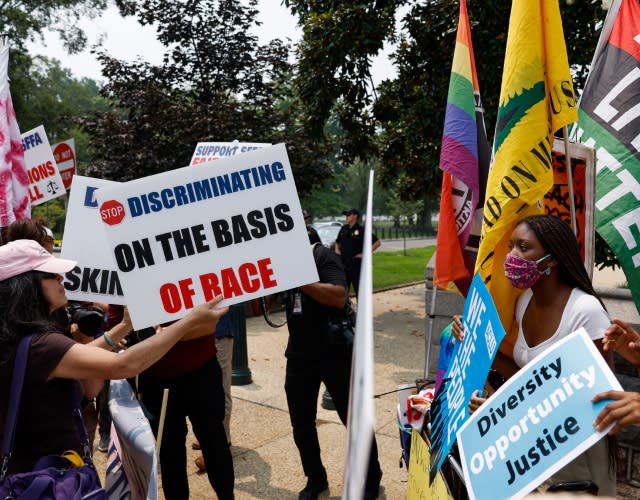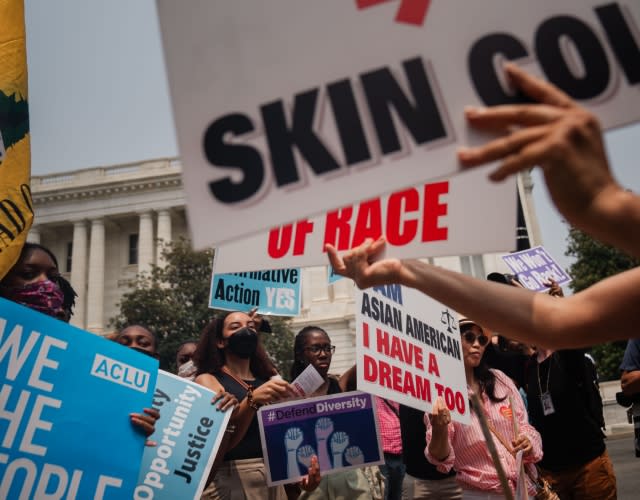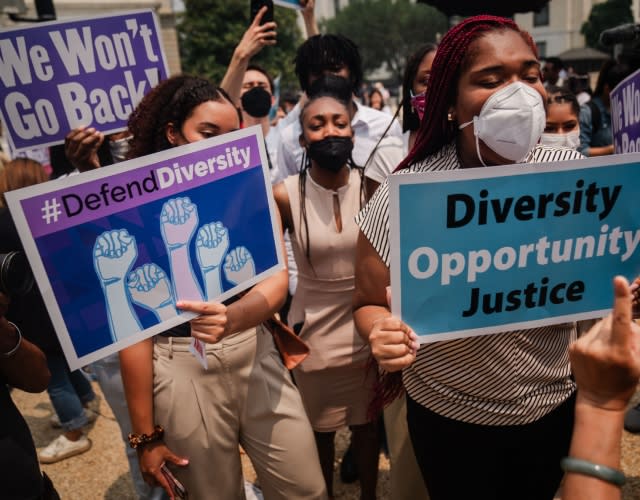The Supreme Court's Affirmative Action Ruling Blatantly Manipulates Next-Gen Leaders Before They Even Hit College

- Oops!Something went wrong.Please try again later.
With the Supreme Court’s Thursday affirmative action ruling and Friday rejection of President Joe Biden’s student loan forgiveness plan, it’s been a dismal week for higher education in America.
SCOTUS’ landmark decision in college admissions is the latest federal move to unravel progress in racial equality, and it’s an intentional decision that will massively interfere with the nation’s pool of future leaders from politicians and lawyers to doctors and teachers.
More from SheKnows
In a 6-3 ruling made on June 29, SCOTUS declared a student applicant’s race is no longer a lawfully considered factor in granting admission to United States colleges and universities. The staggering decision goes against a precedent set by the 1978 Regents of the University of California v. Bakke case, which deemed affirmative action in college admissions legal.
What is affirmative action?
Prior to Thursday’s ruling, affirmative action in college admissions had been upheld for 45 years. Affirmative action refers to any policy that prohibits discrimination and supports equal opportunity for people of any race, sex, gender identity, sexual orientation, religion, and national origin, as well as those who live with a disability. It’s primarily considered in educational and employment contexts.
Click here to read the full article.
Affirmative action programs in higher education have been put in place to help even the playing field between white applicants and students of color who’ve been racially and economically disadvantaged for generations. For nearly 50 years, colleges and universities have considered the race of their applicants to ensure equal opportunities are given to individuals of oppressed backgrounds and to foster a diverse student population.
Why did SCOTUS rule race-based affirmative action unlawful?
Upon reviewing two cases, Students for Fair Admissions Inc. v. University of North Carolina and Students for Fair Admissions Inc. v. President & Fellows of Harvard College, the Supreme Court’s conservative majority found the affirmative action programs implemented by the two institutions to be unconstitutional. In a statement authored by Chief Justice John Roberts, the majority opined that Harvard and UNC’s race-conscious admissions policies violate the Equal Protection Clause of the 14th Amendment.
“The Harvard and UNC admissions programs cannot be reconciled with the guarantees of the Equal Protection Clause. Both programs lack sufficiently focused and measurable objectives warranting the use of race, unavoidably employ race in a negative manner, involve racial stereotyping, and lack meaningful end points,” Roberts wrote. “We have never permitted admissions programs to work in that way, and we will not do so today.”

The chief justice asserted that applicants must be considered from the perspective of their experiences “as an individual — not on the basis of race.” Roberts opined, “Many universities have for too long done just the opposite. And in doing so, they have concluded, wrongly, that the touchstone of an individual’s identity is not challenges bested, skills built, or lessons learned but the color of their skin. Our constitutional history does not tolerate that choice,” he concluded.
Justice Clarence Thomas concurred with Roberts’ statement, reducing the implementation of affirmative action programs to “rudderless, race-based preferences designed to ensure a particular racial mix in their entering classes.”
Thomas, the second Black justice in the Supreme Court’s history, wrote, “While I am painfully aware of the social and economic ravages which have befallen my race and all who suffer discrimination, I hold out enduring hope that this country will live up to its principles so clearly enunciated in the Declaration of Independence and the Constitution of the United States: that all men are created equal, are equal citizens, and must be treated equally before the law.”
The underlying problem of the affirmative action ruling
By no longer being legally required to follow race-based affirmative action policies, colleges and universities have no obligation to ensure they’re giving non-white students a seat at the table. In a country that has historically oppressed Black, Asian, Indigenous, Latino, and mixed-race people, the SCOTUS decision has opened the door for institutional racism to quietly run rampant in higher education.

While many educational institutions will take on the onus of dismantling the barriers to entry for underprivileged groups, others will turn a blind eye while favoring white applicants, especially those of wealthy backgrounds.
That in itself is incredibly concerning, but the more distressing problem is the ripple effect that will inevitably be caused by the ruling.
Systemic oppression and its role in higher education
Historically, white people have been the oppressor, and they’ve subsequently held a majority share of the country’s wealth. Therefore, white families who have amassed generational wealth by having near-unlimited access to opportunities as the most privileged group in American society for centuries will churn out the most “qualified” college candidates.
White people are born into privilege by simply being white. Being white (especially a white man) opens the door to the best educational opportunities, which opens the door to the best job opportunities, which opens the door to the best-salaried positions, which provides money for the basic necessities and finer things in life, as well as the ability to save money. This is a cycle that repeats to create generational wealth, which provides access to both money and connections with other wealthy folks.
This ties back to college admissions in several ways. These applicants will have the schooling and extracurricular activity qualifications, funds to pay for a college education, and “legacy” connections, all of which contribute to having an application accepted.
Systemic racism is real. https://t.co/JsiFa3eEvW
— SheKnows (@SheKnows) February 19, 2019
In contrast, minority groups have historically been oppressed through institutional and structural racism. Over centuries of oppression, people of color have faced a reduced opportunity for high-quality education, and thus that of a good job with a good salary and benefits, which means less money to live off of, which forces minority individuals into low-income neighborhoods with a lack of quality and safe housing, schooling, job opportunities, health care, and even clean water and basic sanitation.
These tiers of systemic oppression create impoverished communities that face overwhelming barriers to entry, which creates a generational cycle that’s nearly impossible to break due to a lack of access and opportunity that’s rooted in racism.
That’s all to say that Black, Asian, Indigenous, Latino, and mixed-race people are at an extraordinary disadvantage in the realm of education, but also life in America as a whole. And this is why race-based affirmative action exists: to recognize the oppressive barriers people of color face, to compensate for the generational disadvantage forced upon them, and to give them a fairer shot at having the same opportunities that are afforded to white people going forward.
So how will the affirmative action ruling impact college admissions?
The court’s three Democratic justices, Sonia Sotomayor, Elena Kagan, and Ketanji Brown Jackson, deemed the conservative majority’s stance a decision that “rolls back decades of precedent and momentous progress.”
In her dissent, Sotomayer elaborated, “[The ruling] holds that race can no longer be used in a limited way in college admissions to achieve such critical benefits,” and that “the Court cements a superficial rule of colorblindness as a constitutional principle in an endemically segregated society.”
She continued, “The result of today’s decision is that a person’s skin color may play a role in assessing individualized suspicion, but it cannot play a role in assessing that person’s individualized contributions to a diverse learning environment. That indefensible reading of the Constitution is not grounded in law and subverts the Fourteenth Amendment’s guarantee of equal protection.” Sotomayer concluded, “The devastating impact of this decision cannot be overstated.”

Jackson’s dissent further emphasized the harrowing effects of the ruling. “With let-them-eat-cake obliviousness, today the majority pulls the ripcord and announces ‘colorblindness for all’ by legal fiat,” she wrote. “Today’s ruling makes things worse, not better. The best that can be said of the majority’s perspective is that it proceeds (ostrich-like) from the hope that preventing consideration of race will end racism. But if that is its motivation, the majority proceeds in vain,” Jackson asserted.
She opined that the majority had “detached itself from this country’s actual past and present experiences” and pointed out that “deeming race irrelevant in law does not make it so in life.” Jackson added, “No one benefits from ignorance.”
Following the court’s decision, Havard released a statement “to reaffirm the fundamental principle that deep and transformative teaching, learning, and research depend upon a community comprising people of many backgrounds, perspectives, and lived experiences.” The prestigious college vowed to “determine how to preserve, consistent with the Court’s new precedent, our essential values” in their admissions process.
And how does the decision have an effect on the next generation’s leaders?
In the painstakingly slow and difficult struggle to evolve the country into one that truly prioritizes equality for all, the affirmative action rule is yet another setback. The United States desperately needs more leaders who will advocate for all people, regardless of their identity. That not only includes politicians, but also lawyers to advocate for those wrongly jailed, doctors to advocate for the racial disparities in healthcare, teachers and educational leaders to provide every student with comprehensive schooling, and more.
And what do you need to attain any of those incredibly influential careers? Access to higher education.
Best of SheKnows
These Effortlessly-Elegant 'Tomato Girl' Baby Names Are Ripe for the Picking
These Celebrity Parents Have Thrown the Most Extravagant Birthday Parties for Their Kids
Sign up for SheKnows' Newsletter.
For the latest news, follow us on Facebook, Twitter, and Instagram.

